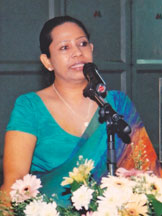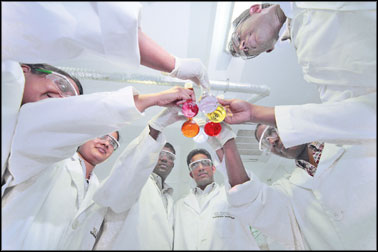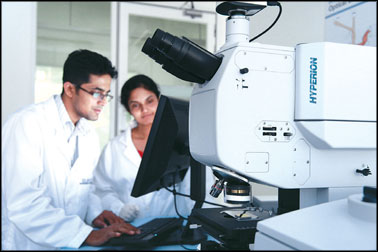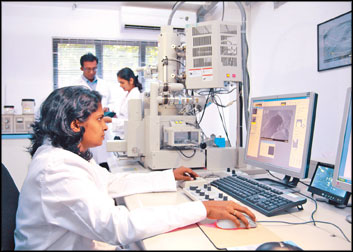|
An international platform to share knowledge,
expertise:
From brain drain to brain gain
By Dhaneshi YATAWARA
 Keeping pace with modern advanced technological trends based on local
expertise and innovation would be the key to empower Sri Lanka.
Contradictorily, the 'brain drain' which we as a country, has
experienced over the past few decades has built a vacuum in the
development and innovations in the Science and Technology field. A
significant number of eminent scientists and technologists moved out of
the country due to many reasons. Keeping pace with modern advanced technological trends based on local
expertise and innovation would be the key to empower Sri Lanka.
Contradictorily, the 'brain drain' which we as a country, has
experienced over the past few decades has built a vacuum in the
development and innovations in the Science and Technology field. A
significant number of eminent scientists and technologists moved out of
the country due to many reasons.
This migration of scientists and researchers from the developing
world to the developed world has been a critical problem to developing
countries such as Sri Lanka. To keep pace with the fast moving world,
developing countries need to come up with a strategy to 'brain gain.'
Promoting and sustaining a globally engaged scientific research
community in the country will pave the path to, in the long-term, not
only encourage technology transfers but attract foreign investments as
well. Keeping this in mind, a program to develop a sustainable sci-tech
culture locally as the base for future progress of the country has been
initiated. It was crucial as the industrial sector was struggling to
boost high-tech based exports from their present status, just 1.5
percent of the total Sri Lankan manufactured exports.
It is in this backdrop that the National Science Foundation (NSF),
the agency responsible for Sri Lanka's science and technology (S&T)
enhancement, under the Ministry of Technology and Research, is creating
an international level platform for scientists, researchers and
technologists, both local and international, to exchange and share their
expertise.
|

Technology and Research Minister Pavithra Wanniarachchi |
The ‘Global Forum for Sri Lankan Scientists’, organised by the
National Science Foundation under the guidance of Senior Minister for
Scientific Affairs Prof. Tissa Vitarana and Technology and Research
Minister Pavithra Wanniarachchi, in collaboration with UNESCO, will be
the ideal forum to upgrade the country’s development. This Forum will be
held in Colombo from December 13–15.
Migration
 “Today, to cope with this issue of migration of scientists to the
developed world, the developing world has come up with various
strategies. The rise of intellectual expatriate networks all over the
developing world during the past decade is one such strategy that has
enabled developing countries to systematically use their expatriate
experts, scientists and technologists for development at home,” said
Chairperson NSF Professor Sirimalee Fernando. “Today, to cope with this issue of migration of scientists to the
developed world, the developing world has come up with various
strategies. The rise of intellectual expatriate networks all over the
developing world during the past decade is one such strategy that has
enabled developing countries to systematically use their expatriate
experts, scientists and technologists for development at home,” said
Chairperson NSF Professor Sirimalee Fernando.
As a country that has experienced considerable “Brain Drain” during
the past few decades, Sri Lanka needs to realign its efforts to build a
strong network to pave the way for the efficient use of S&T expatriates.
“As envisioned in the policy Mahinda Chinthana, Vision for the
Future, this Forum will be the inception point for scientists,
technologists and industrialists to contribute and partake in the
national development process. It will support the science, technology
and innovation strategy of Sri Lanka,” said Prof. Fernando.
She said the Forum will also serve to establish and develop linkages
between expatriate scientists and local scientific institutions, and
provide a platform for the facilitation of technology transfer and
employment expertise to boost the productive capability of Sri Lankan
industry.
Conceptual design
UNESCO has played an initiating role in the conceptual design of the
Forum and is actively involved with the NSF and the Ministry of
Technology and Research in the Forum’s Steering Committee as well as in
facilitating funds to drive this venture forward. It is estimated that
150 expatriate scientists would participate in this conference.
The key resource personnel would be fully funded by the NSF whereas
the other resource persons would be partially funded with local
hospitality.
 “To expand the contribution of science and technology to national
development, public and private partnerships are crucial. We have the
best example with the Sri Lanka Nanotechnology Institute – SLINTEC which
was set up by the Government in partnership with five bluechip
companies,” Prof. Fernando said, explaining the involvement of
industries in this Forum. “To expand the contribution of science and technology to national
development, public and private partnerships are crucial. We have the
best example with the Sri Lanka Nanotechnology Institute – SLINTEC which
was set up by the Government in partnership with five bluechip
companies,” Prof. Fernando said, explaining the involvement of
industries in this Forum.
“The Forum will focus on cutting edge technology that would give a
boost to the industrial development of the country,” said Director NSF
Dr. Sarath Abayawardana, explaining how the Forum would act as a future
investment.
The conferences at the Forum will focus on Nanotechnology,
Biotechnology, Information and Communication Technology, Advanced Design
and Manufacture, Green Energy Technologies, Natural Resources and Food
and Water Security. The Forum will create opportunities for scientists
and entrepreneurs to discuss, deliberate and draw road-maps for
research, alliances and industrial successes.
“This will be a direct meeting point for researchers and
entrepreneurs to seek possible ventures benefiting both sides,” said the
Director NSF.
As the NSF organising committee explained, the main themes of the
Forum reflect national interests that have a major bearing on the
economic development through different sectors of energy, healthcare,
agriculture, tourism and consumer goods and promoting exports.
The Forum will also accentuate on the integrated roles of
technologies, applications and successful commercialisation. For
example, nanotechnology has started leaving the confines of laboratories
and conquering new applications. It is envisaged that the global market
for nanotechnology-based manufactured goods will be worth US$ 1.6
trillion, for the period 2009-2013.
Expatriate scientists
The Overseas Special Training Program (OSTP) and International
Partnerships for Science and Technology (IPSAT), conducted under the
purview of the NSF, harness the knowledge of expatriate scientists. The
IPSAT program facilitates expatriate scientists, engineers, S&T policy
makers and research personnel to undertake collaborative research
assignments for a stipulated period in Sri Lanka.
 The OSTP is targeted at facilitating local scientists, researchers
and engineers to participate in training and short-term research visits
abroad. There are also collaborative activities taking place between
different research groups, largely arising out of individual contacts.
Formalisation of these activities and development of clear cut
mechanisms to improve collaboration is the need of the hour. The OSTP is targeted at facilitating local scientists, researchers
and engineers to participate in training and short-term research visits
abroad. There are also collaborative activities taking place between
different research groups, largely arising out of individual contacts.
Formalisation of these activities and development of clear cut
mechanisms to improve collaboration is the need of the hour.
The NSF is also working towards developing a web portal and a
comprehensive expatriate database simultaneous to the conference that
would facilitate both the local and expatriate scientific community for
the continuity and strengthening of links that are already established.
This Forum would focus on encouraging research that is
industry-oriented to deliver innovative products and processes that will
definitely provide a competitive edge to the industry, enabling them to
compete and harness opportunities in the global market.
The conference would be organised to ensure close interaction among
locals and expatriates as well as to pave the way towards developing
strategies and mechanisms to convert the “Brain Drain” to a “Brain
Gain”.
Pix: Courtesy NSF |

